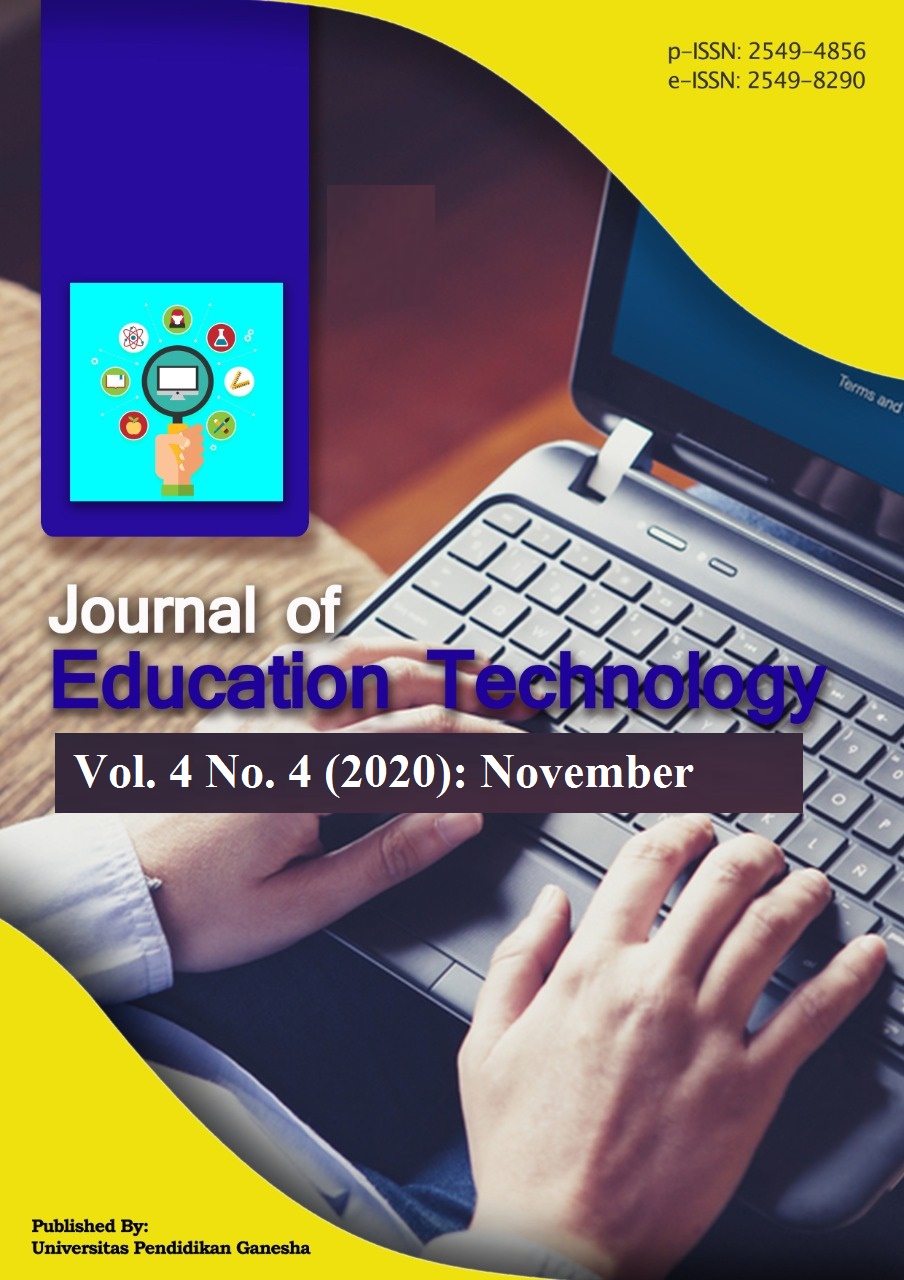The Development of E-Modules Project Based Learning for Students of Computer and Basic Networks at Vocational School
DOI:
https://doi.org/10.23887/jet.v4i4.29230Keywords:
e-module, project based learningAbstract
In the learning process, the teacher acts as the teacher center by using conventional methods so that it causes students to pay less attention to the teacher, and sometimes students experience boredom in learning. The purpose of this research is to develop project-based learning media for computer-based electronic modules and networks. This study uses the Research and Development (R&D) method with 4-D development procedures which include Define, Design, Develop, Desseminate. The data analysis technique uses descriptive analysis techniques to describe the value of the validity, practicality, and effectiveness of the project-based learning E-module. The results of this development research are: the validity of the E-module based on project-based learning is declared valid with the value category 0.83> 0.61, the E-module practicality is based on the responses of two teachers with an average score of 89.3 in the very practical category and 36 student response with an average score of 85.03 in the very practical category. The effectiveness of e-module project-based learning is stated to be effective in improving learning outcomes. Based on the research results, it can be concluded that E-module learning based on project-based learning is valid, practical, and effective to be used as a learning medium in basic computer and network subjects.
References
Asrial, Syahrial, Maison, Kurniawan, & Piyana. (2020). Ethnoconstructivism E-Module to Improve Perception, Interest, And Motivation of Students in Class V Elementary School. Jurnal Pendidikan Indonesia, 9(1), 30–41. https://doi.org/10.23887/jpi-undiksha.v9i1.19222
Diah, & Riyanto. (2016). Problem-Based Learning Model In Biology Education Courses To Develop Inquiry Teaching Competency Of Preservice Teachers. Cakrawala Pendidikan, 35(1), 47–57. https://doi.org/https://doi.org/10.21831/cp.v1i1.8364
Diantari, Damayanthi, Sugihartini, & Wirawan. (2018). Pengembangan E-modul berbasis Mastery Learning untuk Mata Pelajaran KKPI Kelas XI. Jurnal Nasional Pendidikan Teknik Informatika (Janapati), 7(1), 33–48. https://doi.org/http://dx.doi.org/10.23887/janapati.v7i1.12166
Haryati, Y. (2017). Model Problem Based Learning Membangun Kemampuan Berpikir Kritis Siswa Sekolah Dasar. Jurnal Cakrawala Pendas, 3(2), 57–63.
Istiningrum, A. A. (2017). Peningkatan Self-Regulated Learning Skills Mahasiswa Pada Mata Kuliah Akuntansi Pengantar Melalui Problem-Based Learning. Cakrawala Pendidikan, 36(1), 81–91.https://doi.org/https://journal.uny.ac.id/index.php/cp/article/view/11080/pdf.
Kimianti, & Prasetyo. (2019). Pengembangan E-Modul IPA Berbasis Problem Based Learning Untuk Meningkatkan Literasi Sains Siswa. Kwangsan Jurnal Teknologi Pendidikan, 7(2). https://doi.org/https://doi.org/10.31800/jtp.kw.v7n2.p91--103.
Laili, Ganefri, & Usmeldi. (2019). Efektivitas Pengembangan E-Modul Project Based Learning pada Mata Pelajaran Instalasi Motor Listrik. Jurnal Ilmiah Pendidikan Dan Pembelajaran, 3(3). https://doi.org/http://dx.doi.org/10.23887/jipp.v3i3.21840. 306-309
Marzuki, & Basariah. (2017). The Influence Of Problem-Based Learning And Project Citizen Model In The Civic Education Learning On Student’scritical Thinking Ability And Self Discipline. Cakrawala Pendidikan, 6(3), 382–400. Retrieved from https://journal.uny.ac.id/index.php/cp/article/view/14675/pdf.
Pramana, Jampel, & Pudjawan. (2018). Meningkatkan Hasil Belajar Biologi Melalui E-Modul Berbasis Problem Based Learning. Jurnal Edutech Undiksha, 8(2), 18–32. https://doi.org/http://dx.doi.org/10.23887/jeu.v8i2.28921
Rajagukguk, & Simanjuntak. (2015). Problem-Based Mathematics Teaching Kitsintegrated With Ict To Improvestudents’ Critical Thinking Ability Injunior High Schools In Medan. Cakrawala Pendidikan, 34(3). https://doi.org/https://journal.uny.ac.id/index.php/cp/article/view/7342/pdf
Safitri, I. (2017). Pengembangan E-Module Dengan Pendekatan Pembelajaran Matematika Realistik Berbantuan Flipbook Maker Pada Materi Bangun Ruang Sisi Datar Kelas Viii Smp. Aksioma, 6(2), 1. https://doi.org/10.26877/aks.v6i2.1397
Sari, Sartijono, & Sihono. (2015). Penerapan Model Pembelajaran Berbasis Proyek (Project Based Learning) untuk Meningkatkan Hasil Belajar Keterampilan Berbicara Siswa Kelas VA SDN Ajung. Jurnal Edukasi, 2(1), 11–14. Retrieved from http://jurnal.unej.ac.id/index.php/JEUJ/article/download/3404/2658
Serevina, Sunaryo, Raihanati, Sari, & Juwita. (2018). Development of E-module Based on Problem Based Learning (PBL) on Heat and Temperature to Improve Student’s Science Process Skill”. Turkish Online Journal of Educational Technology-TOJET, 17(3), 26–36. Retrieved from https://eric.ed.gov/?id=EJ1184205
Silalahi, M. V. (2020). Development of E-Modules Based on Exe-Learning on Topics of Reaction Rate Against Student Learning Outcomes Mechanical Engineering. International Journal of Education and Research and Curriculum Application, 3(2), 114–120. https://doi.org/https://doi.org/10.31764/ijeca.v3i2.2672
Suarsana, I. M. (2013). Pengembangan E-Modul Berorientasi Pemecahan Masalah Untuk Meningkatkan Keterampilan Berpikir Kritis Mahasiswa. JPI (Jurnal Pendidikan Indonesia), 2(2), 264–275. https://doi.org/10.23887/jpi-undiksha.v2i2.2171
Sugihartini, & Laba. (2017). Pengembangan E-modul mata kuliah strategi pembelajaran. Jurnal Pendidikan Teknologi Dan Kejuruan, 14(2), 221–230.
Suryandari, Sajidan, Rahardjo, Prasetyo, & Fatimah. (2018). Project-Based Science Learning And Pre-Service Teachers’ Science Literacy Skill And Creative Thinking. Cakrawala Pendidikan, 37(3). Retrieved from https://journal.uny.ac.id/index.php/cp/article/view/17229/pdf
Udayana, Wirawan, & Divayana. (2017). Pengembangan E-modul pada mata pelajaran pemrograman berorientasi objek dengan model pembelajaran Problem Based Learning Kelas VIII rekayasa perangkat lunak. Jurnal Nasional Pendidikan Teknik Informatika (Janapati), 6(2), 128–139. https://doi.org/https://www.researchgate.net/deref/http%3A%2F%2Fdx.doi.org%2F10.23887%2Fjanapati.v6i2.9373
Warsita, B. (2017). Peran dan Tantangan Profesi Pengembang Teknologi Pembelajaran Pada Pembelajaran Abad 21. Kwangsan: Jurnal Teknologi Pendidikan, 5(2). https://doi.org/https://doi.org/10.31800/jtp.kw.v5n2.p77--90
Wulandari, Sudatha, & Simamora. (2020). Pengembangan Pembelajaran Blended Pada Mata Kuliah Ahara Yoga Semester II di IHDN Denpasar. Jurnal Edutech Undiksha, 8(1), 1–15. https://doi.org/http://dx.doi.org/10.23887/jeu.v8i1.26459
Yasa, Chrisyarani, & Mudiono. (2018). E-module Based on Ncesoft Flip Book Maker for Primary School Students. International Journal of Engineering & Technology, 7(3), 286–289. Retrieved from https://www.sciencepubco.com/index.php/ijet/article/view/19973/9312
Downloads
Published
How to Cite
Issue
Section
License
Authors who publish with the Journal of Education Technology agree to the following terms:
- Authors retain copyright and grant the journal the right of first publication with the work simultaneously licensed under a Creative Commons Attribution License (CC BY-SA 4.0) that allows others to share the work with an acknowledgment of the work's authorship and initial publication in this journal.
- Authors are able to enter into separate, additional contractual arrangements for the non-exclusive distribution of the journal's published version of the work (e.g., post it to an institutional repository or publish it in a book), with an acknowledgment of its initial publication in this journal.
- Authors are permitted and encouraged to post their work online (e.g., in institutional repositories or on their website) prior to and during the submission process, as it can lead to productive exchanges, as well as earlier and greater citation of published work. (See The Effect of Open Access)
















